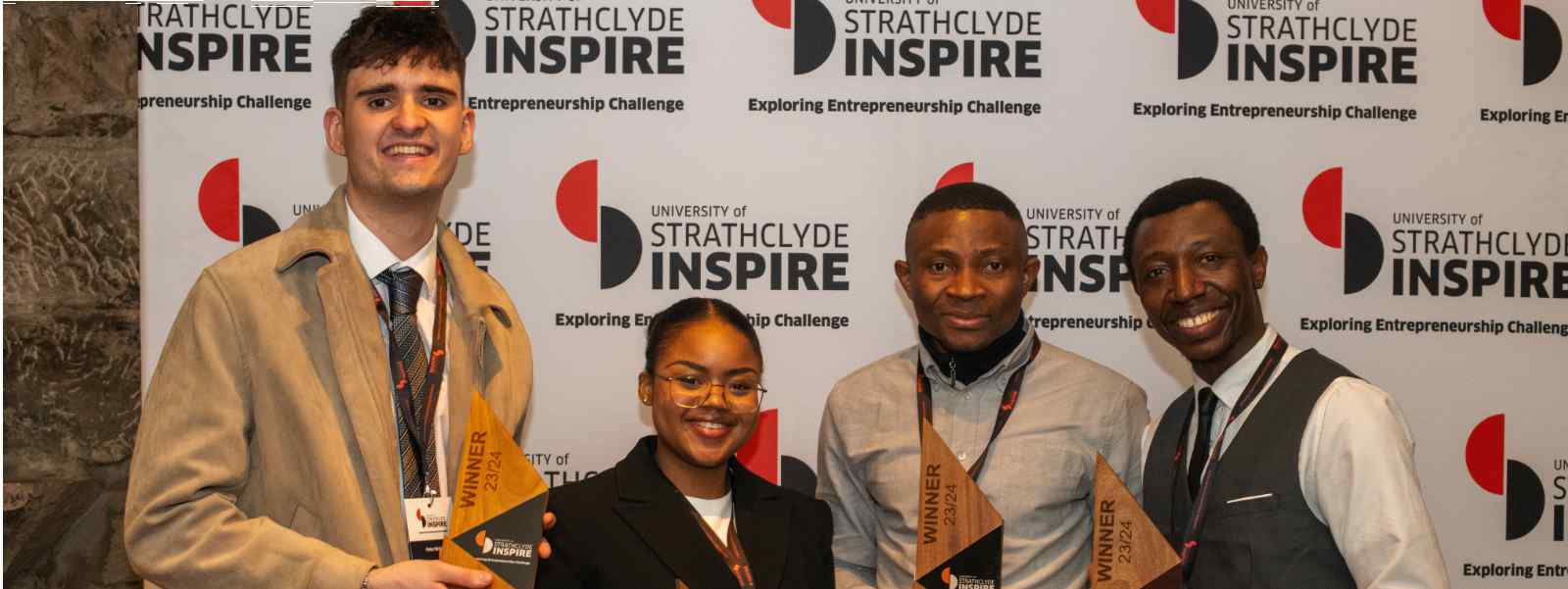
An idea to create a marketplace for students to stop wastage of educational resources took top prize at a Strathclyde pitching contest.
The StrathEssentials team were awarded £2,000 at the University’s live pitching event for students, the Exploring Entrepreneurship Challenge (EEC), on March 13 in Glasgow.
The five-strong team faced competition from four other student finalist teams with their idea to bring students together and create a circular economy, where textbooks, lab coats, and calculators can be picked up at affordable prices.
The team plan to open in Strath Union and expand online and beyond the University to other educational institutions.
Creative idea
More than 200 students took part in a mix of online and in-person learning experiences as they faced the challenge of creating an idea that would address a UN Sustainable Development Goal. In the process, they gained skills of creative-thinking, problem-solving and collaboration, helping them to unlock their potential, whatever their ambitions for the future.
Finalist team ideas ranged from bringing mobile green spaces to dense urban areas, to bringing relief to conflict zones and disaster-stricken areas by repurposing shipping containers as sustainable modular homes.
The winning team members were Natasha Chitambo, Alexandros Christou, Ubong Essien, Peter McAdoo and Fidelis Usman, and their idea connects to SDG4, which aims to ensure inclusive quality education for all.
Peter, who studies in the University’s Business School, said: “We want to promote sustainability through creating a marketplace that will allow people to sell or purchase used educational resources at an affordable price.
“Through this, we hope to increase access to quality education for all students, starting here at Strathclyde and expanding in the future.”
Natasha, who studies in the Faculty of Humanities and Social Sciences, and is from Zimbabwe, said: “I think the biggest thing that we had going for us is our passion. Even though we are from completely different backgrounds, and completely different places, we all understand what it’s like to have to deal with the problems that come with being a student. This idea is feasible and practical, and we felt connected to it on a deep level, so we pushed through with it.
The biggest thing I’ve learned is that entrepreneurship is not just about starting a business, but it’s actually your mindset and who you are as a person.
The awards the team received were crafted by University Education Technician Will Noon from old laboratory workbenches.
A total of 28 teams across two cohorts developed their ideas into a single page pitch, receiving tips from mentors in Strathclyde Inspire's diverse ecosystem of entrepreneurs. Five finalist teams were then allocated a Supporter who worked with them to develop their pitch further, before presenting their idea to an audience of peers, mentors and entrepreneurs, who voted for the winner.
Flagship programme
The EEC is the University’s flagship entrepreneurial training programme. Developed by Strathclyde Inspire, it is one of several activities that encourages students to develop an entrepreneurial mindset and enhance their employability.
Fiona Ireland, Head of Entrepreneurship Strategy at the University of Strathclyde, said: “The EEC is nurturing a generation of changemakers poised to tackle the world’s most pressing issues.
The future is undeniably bright for all the students who took part. Their passion has really shown me the transformative potential of young minds in shaping a sustainable world for everyone.
Strathclyde Inspire worked in partnership with the University’s Centre for Sustainable Development to deliver a workshop on the UN Sustainable Development Goals to all of the EEC participants. The ideas generated by the students aimed to address two of the Goals: SDG4, which aims to ensure inclusive quality education for all, and SDG11, which focuses on making cities and communities safe, resilient, and sustainable.